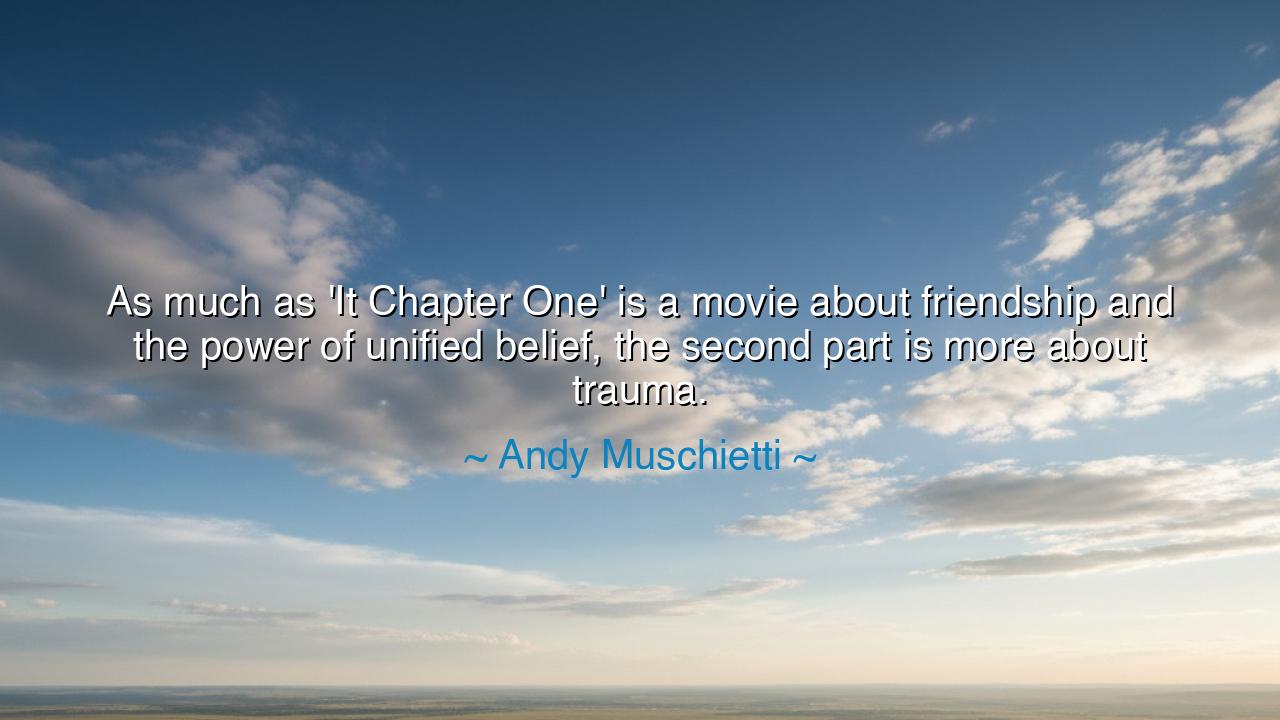
As much as 'It Chapter One' is a movie about friendship and the
As much as 'It Chapter One' is a movie about friendship and the power of unified belief, the second part is more about trauma.






“As much as It Chapter One is a movie about friendship and the power of unified belief, the second part is more about trauma.” In this reflection, Andy Muschietti, the director of It, speaks not merely of his film but of the human condition itself. For the story of It—though wrapped in horror and fantasy—is in truth a parable of life: how the innocence of friendship and the strength of belief face the shadows of memory, fear, and trauma that linger long after childhood fades. The first tale celebrates unity, courage, and hope; the second, the scars that time and terror carve into the soul. In this duality lies Muschietti’s wisdom: that every joy we share in youth must one day be tested by the darkness we carry into adulthood.
In Chapter One, the children of Derry stood as one—a circle of hearts bound not by blood, but by shared purpose. They conquered evil because they believed, not only in themselves but in one another. Their strength was collective; their victory, pure. This was the time of innocence, when courage rose naturally, and belief could still vanquish fear. But time, relentless and silent, carried them away from that unity. And when they grew, when their lives stretched apart and their dreams scattered, the shadows of the past—long buried—began to stir again. This is the lesson of Chapter Two: that the monsters we defeat as children often return when we forget who we once were.
Muschietti’s insight is not confined to his film; it mirrors the cycles of every human life. The trauma of youth—whether born from cruelty, loss, or shame—does not vanish simply because we age. It sleeps beneath the surface, waiting. And when it awakens, it demands remembrance, reconciliation, healing. The Losers’ Club of Derry, now adults, must face what they once fled. Each must look into the mirror of memory and see not the child they were, but the wounds they have become. Their struggle is our own: the battle to confront the buried pain that shapes us, and to rediscover the light that once burned so freely.
There is an echo here of Homer’s Odyssey, where the hero, after years of wandering, returns not to adventure but to reckoning. Odysseus must face his ghosts—not only the monsters of the sea, but the emptiness within, the grief of loss and the distance between who he was and who he has become. So too do Muschietti’s heroes return to Derry not for glory, but for healing. Their quest is not outward but inward. The power of unified belief, once the weapon of their youth, becomes now the medicine for their pain. Through facing the darkness together once more, they remember what it means to be whole.
It is no small thing to say that friendship and trauma are the twin pillars of human growth. One binds us; the other breaks us. But even the breaking can lead to strength. Muschietti’s vision tells us that trauma, though cruel, is not final—it can be faced, understood, even transformed. When pain is shared among those who care, it loses its poison. When fear is spoken aloud, it loses its power. The great healing of life comes not from forgetting, but from remembering together. In unity, the scars of yesterday can become the wisdom of tomorrow.
We see this truth in the story of many who have endured great darkness and yet found rebirth through connection. Consider Viktor Frankl, survivor of the concentration camps, who wrote that even in the deepest suffering, the human soul can find meaning through love, through memory, through faith. Like the Losers returning to face their monster, Frankl faced his own, and from his pain came compassion for all who suffer. His life reminds us that trauma does not define us—it invites us to rise beyond it.
Thus, Muschietti’s words carry a profound lesson: do not turn from your trauma, nor from those who share it with you. Gather your friends—the ones who knew you before you forgot yourself—and face the shadows together. Speak openly of your pain, and remember that belief, though it may flicker, never truly dies. If you stand united, as those children once did, even the monsters within will yield.
For in the end, It is not merely a tale of horror, but a reflection of life’s deepest truth: that friendship is the light that guides us through darkness, and that healing begins not when we forget the past, but when we have the courage to face it—with others by our side. Cherish your companions, honor your scars, and let your shared belief be the bond that transforms fear into strength, and trauma into triumph.






AAdministratorAdministrator
Welcome, honored guests. Please leave a comment, we will respond soon